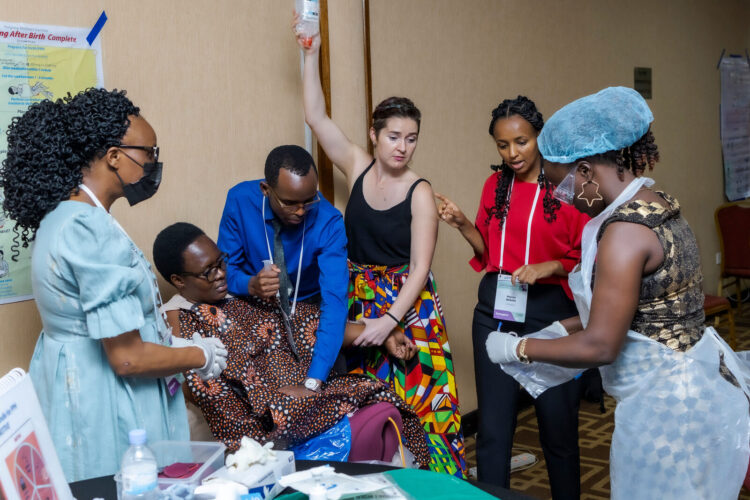World PPH Day: A New Collective Call to End Preventable Maternal Deaths

Every year, tens of thousands of women die from postpartum haemorrhage (PPH)—severe bleeding after birth that is both preventable and treatable. In 2023 alone, nearly 45,000 women lost their lives to PPH, making it the leading cause of maternal death worldwide. Most of these deaths occurred in low- and middle-income countries, where health systems are under-resourced, supplies are inconsistent, and too many women still give birth without skilled care.
These deaths are not inevitable. Effective medicines, tools, and training exist to prevent and treat PPH. What has been missing is global attention, political will, and coordinated action to ensure that every woman, everywhere, can benefit from them.
Today, on 5 October 2025, the global maternal health community takes an important step forward. We are proud to announce that from this year onward, 5 October will be marked annually as World PPH Day—a moment for collective action, advocacy, and accountability to end preventable maternal deaths from PPH.
How World PPH Day Came to Be
The idea for World PPH Day emerged from the WHO Roadmap to Combat Postpartum Haemorrhage (2023–2030), which called for bold, unifying advocacy to keep the fight against PPH at the top of the global health agenda. Over the past two years, momentum has grown as organisations, professional associations, and civil society have joined forces to make this vision a reality.
The International Confederation of Midwives (ICM) has played a leading role in this collective effort alongside the World Health Organization (WHO), the International Federation of Gynaecology and Obstetrics (FIGO), the United Nations Population Fund (UNFPA), the Partnership for Maternal, Newborn and Child Health (PMNCH), Jhpiego, the Reproductive Health Supplies Coalition, UNITAID, Meridian Global Health, White Ribbon Kenya, WACI Health, and the Department of Women’s and Children’s Health at the University of Liverpool, UK, together with many other partners working through the PPH Advocacy Working Group and the global PPH Community of Practice, which now connects more than 70 organisations worldwide.
Standing united on the 5th October sends a clear message: no woman should die from preventable PPH.
Why This Day Matters
World PPH Day provides a strategic platform to:
- Raise awareness of PPH as a leading, preventable cause of maternal death.
- Honour the lives lost each year to this condition and amplify the voices of survivors and their families.
- Mobilise governments and funders to prioritise resources, policies, and training for PPH prevention and treatment.
- Highlight solutions that already exist, from uterotonics and tranexamic acid to bundled treatment approaches and skilled midwifery care.
- Hold ourselves accountable by reviewing progress each year and calling for action where gaps remain.
The inaugural World PPH Day also marks the launch of a consolidated suite of global recommendations and clinical tools, jointly developed by WHO, FIGO, and ICM. These evidence-based resources will support countries to standardise care, scale up proven interventions, and save lives.
Lessons and Progress
The past two years have shown that change is possible when evidence, policy, and practice come together.
- Countries such as Nigeria, Ethiopia, Rwanda, India, Bangladesh, and Kenya have already integrated PPH treatment bundles into national guidelines and training programmes.
- Kenya has strengthened supply chain monitoring for essential medicines.
- Bangladesh has rolled out digital decision-support tools for midwives to standardise early recognition and response.
- Pilot programmes in Nigeria, Uganda, Ghana, Malawi, Nepal, Pakistan, Sierra Leone, and India demonstrate that when supply chains, midwifery training, and community engagement are combined, maternal deaths from PPH can be dramatically reduced.
These successes prove what many in the maternal health field have long known: PPH deaths are preventable, but only if governments and health systems commit to prioritising women’s lives.
A Call to Action
The establishment of World PPH Day raises awareness and represents a call to action We acknowledge the power of collective advocacy and the progress made. But we also challenge governments, funders, and health leaders to go further:
- Count and report every maternal death from PPH, fostering a culture of accountability.
- Invest in the tools, medicines, and training needed to ensure every provider is prepared.
- Support midwives and health workers on the front lines with the resources and recognition they deserve.
- Ensure equity, so that the poorest and most marginalised women—those at highest risk—are not left behind.
With strong leadership, strategic partnerships, and a shared commitment to equity, ending preventable deaths from PPH is within reach.
Looking Ahead
From 2025 onward, 5 October will serve as an annual milestone—a chance to reflect, to push for progress, and to remind the world that PPH is not just a clinical emergency, but a human rights and social justice issue. Each year, the day will focus on a priority theme, aligning with global goals such as the Sustainable Development Goals and Universal Health Coverage.
World PPH Day is a chance for us all to stand together and say enough is enough. There must be Zero tolerance for preventable death from PPH. No woman should die from a condition we know how to prevent and treat. Lest we forget, a newborn without a mother is a newborn whose life chances are limited! We must move past preventable causes of death like PPH and build systems that eradicate this. This day, the 5th October will maintain what must be a relentless focus, drive an determination to ensure that maternal health remains our absolute priority